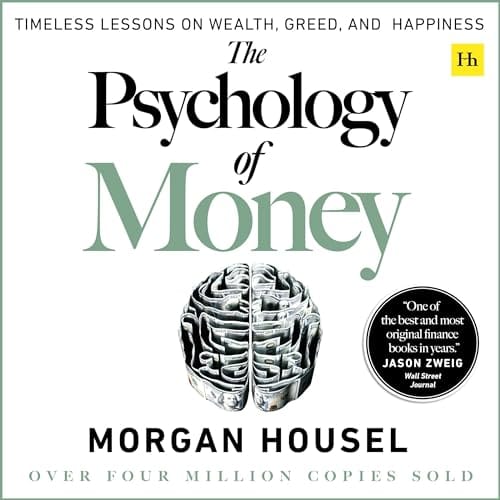Overview : The Psychology of Money
- Book Title: The Psychology of Money
- Author: Morgan Housel
- Publication Date: September 2020
- price: $5.99
- Pages: 252
Overview of the Book
Morgan Housel is an award-winning financial writer, former columnist at The Motley Fool and The Wall Street Journal, and a partner at Collaborative Fund. His book The Psychology of Money explores how people think about money and make financial decisions, blending stories and behavioral insights.
Introduction
In the vast sea of personal finance literature, Morgan Housel's "The Psychology of Money: Timeless Lessons on Wealth, Greed, and Happiness" emerges as a beacon of fresh insight. This compelling work dives deep into the psychological underpinnings of our financial decisions, offering readers a unique perspective on wealth management that goes beyond mere numbers and strategies.
Book Summary
Housel's central thesis revolves around the idea that financial success is more about behavior than raw intelligence or technical knowledge. Through a series of 19 short stories, he illustrates how our personal experiences and psychological biases shape our relationship with money. Key themes explored in the book include: - The role of luck and risk in financial outcomes - The importance of long-term thinking and compounding - The value of contentment and defining "enough" - The impact of personal history on financial decision-making
Analysis of Themes
Behavioral Finance Insights
One of the book's strongest aspects is its exploration of behavioral finance concepts. Housel expertly breaks down complex psychological phenomena like loss aversion and the sunk cost fallacy, demonstrating how these biases can lead to suboptimal financial decisions. For instance, he explains how the pain of losing money often outweighs the pleasure of gaining an equivalent amount, leading many investors to adopt overly conservative strategies that may hinder long-term wealth accumulation.
The Unpredictability of Markets
Housel's discussion on market unpredictability is particularly relevant in today's volatile economic climate. He argues that accepting the inherent uncertainty in financial markets is crucial for maintaining a sound investment strategy. This perspective is especially pertinent when considering recent market trends and the rise of cryptocurrencies, which have introduced new layers of complexity to the investing landscape.
Personal Finance as a Personal Journey
Perhaps the most refreshing aspect of Housel's work is his emphasis on the personal nature of finance. He contends that there's no one-size-fits-all approach to money management, encouraging readers to align their financial strategies with their individual values and goals.
Writing Style
Housel's writing is accessible and engaging, peppered with anecdotes and historical examples that bring his points to life. His ability to distill complex financial concepts into relatable stories makes "The Psychology of Money" an enjoyable read for both finance novices and seasoned investors alike.
Strengths and Weaknesses
Strengths:
- Fresh perspective on personal finance - Engaging storytelling - Practical insights backed by psychological research - Emphasis on long-term thinking and behavioral aspects of wealth
Weaknesses:
- Limited technical financial advice - Some concepts may be familiar to well-read finance enthusiasts - Lack of specific action plans for implementation
Comparison to Other Works
While "The Psychology of Money" shares some common ground with classics like "Rich Dad Poor Dad" by Robert Kiyosaki and "Think and Grow Rich" by Napoleon Hill in its focus on mindset, Housel's work stands out for its grounding in behavioral science and historical analysis. Compared to more technical works like "A Random Walk Down Wall Street" by Burton Malkiel, Housel's book offers a more accessible entry point for those looking to understand the human side of finance.
Key Quotes
"Doing well with money has a little to do with how smart you are and a lot to do with how you behave." "The highest form of wealth is the ability to wake up every morning and say, 'I can do whatever I want today.'" "Good investing is not necessarily about making good decisions. It's about consistently not screwing up."
Conclusion
"The Psychology of Money" is a thought-provoking and insightful exploration of the complex relationship between human behavior and financial decision-making. By focusing on the psychological aspects of wealth management, Housel provides readers with a fresh perspective that can help them navigate the often turbulent waters of personal finance. Whether you're a novice investor looking to build a solid financial foundation or a seasoned professional seeking to refine your approach, this book offers valuable lessons that can be applied to various aspects of financial planning, from investing and saving to budgeting and retirement planning. In a world where financial advice often feels prescriptive and impersonal, Housel's emphasis on individual context and behavioral understanding is both refreshing and empowering. By reading this book, you'll gain not just financial knowledge, but also the tools to make more mindful and personalized financial decisions.
Ready to Transform Your Financial Mindset?
If you're intrigued by the insights shared in this review and want to dive deeper into the psychology of money, why not grab your own copy of Morgan Housel's enlightening book? Click the link below to purchase "The Psychology of Money" and start your journey towards a more thoughtful and successful financial future. [Affiliate Link: Purchase "The Psychology of Money" on Amazon] Remember, understanding the psychology behind your financial decisions is the first step towards achieving true financial freedom. Don't miss out on the valuable lessons this book has to offer!





